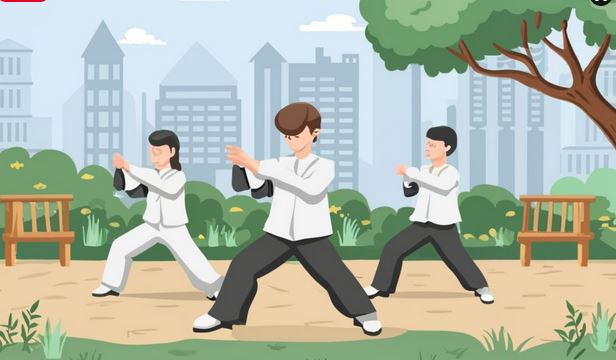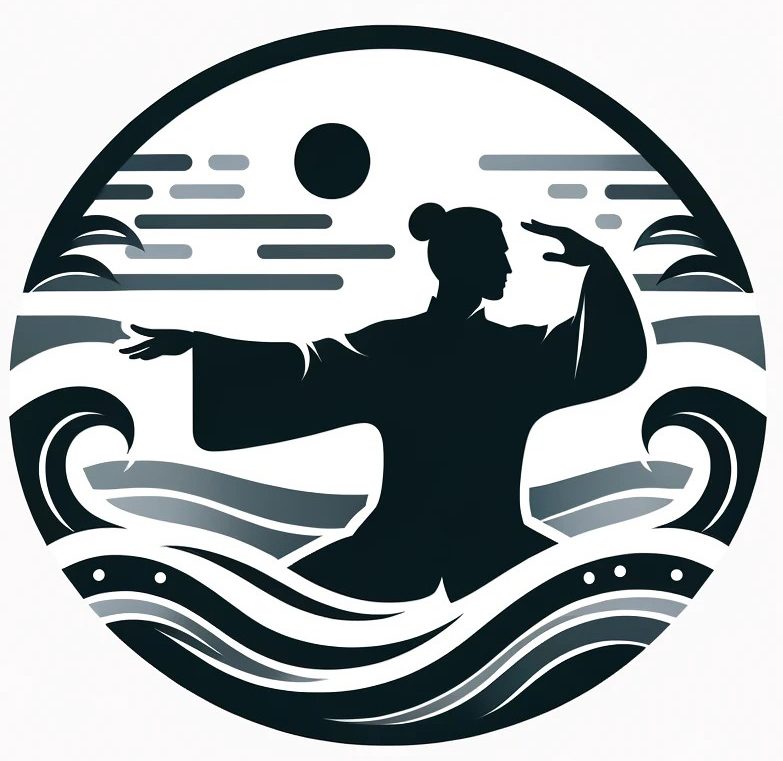Because practicing Chen-style Tai Chi Quan adopts abdominal breathing, which requires gentle inhalation and long exhalation. This breathing method allows the inhaled qi to converge into the spine, without protruding the chest forward. Instead, the chest should contract inward with inhalation. During exhalation, the internal qi descends and sinks below the navel to the Guan Yuan acupoint. This breathing method conforms to the physiological circulation pattern of the human body and enhances the requirements of physiological circulation. It increases blood circulation and provides sufficient blood and oxygen supply to the brain, promoting effective relaxation of the brain.
Practicing Chen-style Tai Chi Quan can help children develop normally, promote their growth, suppress hyperactivity in children, and facilitate brain development, thus improving their responsiveness.
Further analysis of the benefits of children practicing Chen-style Tai Chi Quan reveals that it strengthens liver and gallbladder functions, increases bile secretion, enhances gastric digestion, provides self-massage to the stomach, and maintains the absorption system. It promotes normal development.

If the wrong exercise is chosen, qi may stagnate in the chest. Daily feelings of chest fullness can affect appetite. Without appetite, digestion becomes impaired, resulting in pale complexion, loss of appetite, and disharmony of the stomach. This affects the stomach’s ability to digest food. As a result, the stomach becomes weak, leading to acidity and severely impacting overall health, normal development, body weight, and growth in children. Choosing to practice Chen-style Tai Chi Quan can provide optimal assistance for adolescents and children during their growth period.
Practicing Chen-style Tai Chi Quan relaxes the body and mind of adolescents and children, relieves stress, aids in food digestion and nutrient absorption, while also balancing yin and yang, regulating vital energy, and improving the internal dynamics of the body.
Practicing Chen-style Tai Chi Quan has a tremendous fitness effect on adolescents and children. The breathing and sinking of qi to the dantian in Chen-style Tai Chi Quan relaxes the brain, helping to improve symptoms of hyperactivity disorder. By relaxing the brain, children’s responsiveness is enhanced, memory is improved, learning ability is increased, and the pressure caused by various tasks is relieved.
Practicing Chen-style Tai Chi Quan effectively relaxes muscles and ligaments, enhances self-defense capabilities, and is both a combat and self-defense martial art. It is also a form of exercise for longevity and health. Due to its characteristic of overcoming hardness with softness, employing gentle and yielding force, and striking preemptively, Chen-style Tai Chi Quan is faster and more powerful than other martial arts, with long-reaching and profound strength.
there is a student named Even who is in the Saturday 11am class. He is the only child in the class who practices with adults. When Even ,was 8 years old, his mother came to find Teacher Cheng Jincai and told him that her son frequently fell ill, experienced chest tightness, and often had pain. She asked if he could practice Tai Chi Quan. Teacher Cheng Jincai asked her, “What caused this?” She said he had been practicing another martial art for a year. Teacher Cheng Jincai told her that it was caused by long-term stagnation of qi in the chest and that practicing Chen-style Tai Chi Quan for a few months would naturally alleviate the symptoms. His mother made up her mind to let Even practice Chen-style Tai Chi Quan, and after a few months of practice, his body became very strong, and all his illnesses were cured. He also won multiple gold medals in martial arts competitions in Houston.
Another student is an American girl named Sonia,, who is 18 years old this year and lives in the northern part of Houston. When she was twelve, she had dizziness every day and couldn’t attend school normally. Her father would drive for over an hour to Chinatown to find a Chinese doctor to treat her. After six months of treatment with no significant improvement, the doctor recommended that she learn Tai Chi Quan. With the doctor’s recommendation, her father brought her to my Chen-style Tai Chi Quan promotion center to learn Tai Chi Quan. During her first class, she only practiced for 30 minutes, but she immediately experienced headaches, dizziness, and a feeling of disorientation. She sat in a chair, closed her eyes, and rested without daring to move, as any movement would worsen her dizziness. In the second class, she practiced for more than 40 minutes and had the same experience as the first time. I told her that she must persevere and not give up. She listened to my words, persisted, and by the third class, she was able to endure the practice. From then on, she gained confidence. With the support of her parents, she persisted and persevered. After three months, her headaches and dizziness never recurred. Her parents were delighted and immediately had their second and third daughters join in learning Chen-style Tai Chi Quan. Every time they came for a class, the whole family participated. Now, Sonia Torres no longer experiences dizziness, has a healthier body, improved learning ability, and enhanced memory. Her academic performance has consistently been among the top in her school. Additionally, she has developed excellent martial arts skills. She often performs Chen-style Tai Chi Quan, double knives, and other weapons in Chinese and mainstream community events, bringing joy and enjoyment to people. Over the years, she has participated in various martial arts competitions in the United States and won numerous gold and silver medals. This year, during her college admissions process, she was accepted by the top ten universities in the United States, including Harvard and Yale, due to her outstanding achievements and performances. Learning Chen-style Tai Chi Quan has brought her substantial rewards.


